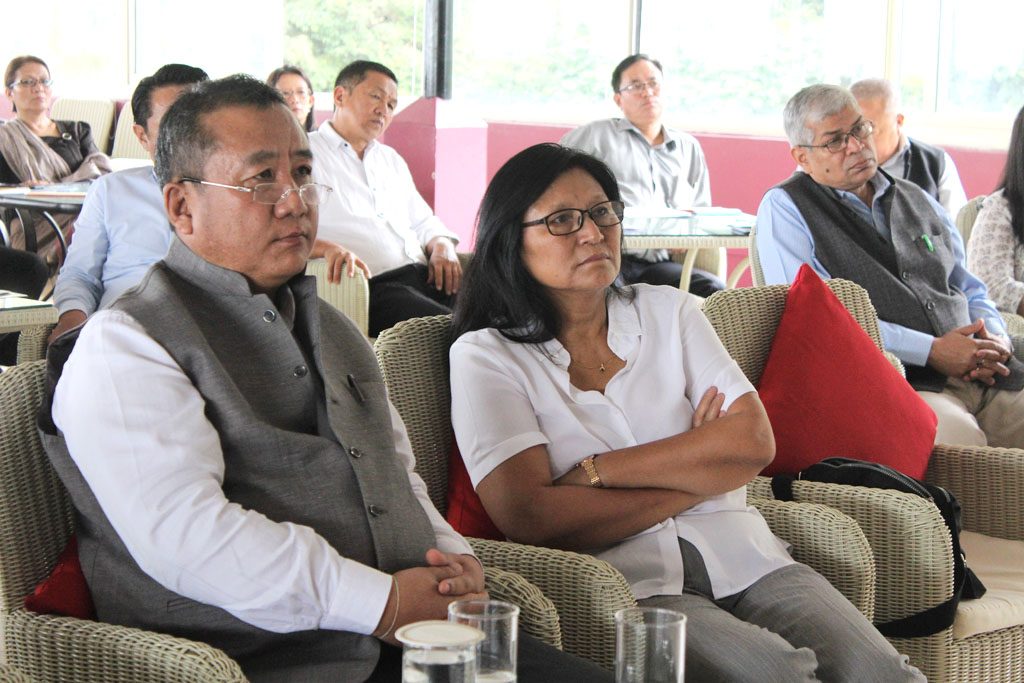Nagaland
Multipronged approach needed to adapt to Climate Change — Toy

Kohima, Aug. 9 (EMN): The chief secretary of Nagaland, Temjen Toy, on Wednesday said, ‘Climate Change is real; it is here to stay and its evidences are everywhere’ such as change in weather patterns, farming seasons, quantum of rainfall, and the recent monsoon-related emergency across the state.
Speaking at a day-long orientation programme on Climate Change adaptation for senior government officials in Nagaland at Hotel Vivor in Kohima, the bureaucrat said Nagaland has its State Action Plan on Climate Change (SAPCC) in place. Bringing in laws and policies for Climate Change in accordance to national prerogatives has been complied with. But, he said, ‘These were still all on paper.’ “How serious we are in ensuring that things are happening as it should is a worrying challenge,” he said. He observed that people had started talking in small groups about Climate Change and how to adapt to the change. But concerted efforts are needed for which convergence of all the departments, policies, plans activities and even finances is necessary, he said.
“Some departments may think that they have nothing to do with Climate Change, that it does not affect their departments. But mind you, Climate Change affects each and every one of us,” Toy reminded. He maintained that the looming test was how to build institutional capacities and awareness among agencies, organisations and citizens to recognise and deal with not just the challenges of climate eventualities but to adopt climate-friendly measures, technology and lifestyles. For this, he pointed out the need for a multipronged approach, ranging from evidence-based policy-making to securing livelihoods, climate-proofing state investments, and upgrading technical capacity at all levels.
Toy is of the view that one of the biggest challenges for a mountainous and agrarian state like Nagaland would be the impact on agriculture and infrastructure, which would hit livelihoods, communications and pose numerous problems ranging from health problems, water availability, energy security, and food security among many others.
Stating that a good and consistent data would be needed to plan for such challenges, the bureaucrat expressed concern that the data that the state has continues to be of poor quality, and inconsistent and at times unreliable. He cited the example of different data having a varying total of villages in Nagaland.
“There is a need to ensure that data management and its generation is given proper attention on a priority basis. We need to embark a ‘one state one data’ mission,” he said in emphasis.
Globally, he said, there were numerous goals for action including conservation, adaptation mitigation, education, wealth-creation, water resources, and environment and social justice, which require detailing in terms of planning and execution.
“Climate Change cannot be met by piecemeal solutions but through convergence and collaborative actions. It is complex but sometimes, complex problems do need simple solutions and therefore, we need to be creative and innovative,” the chief secretary said. He emphasised the need for the state government to be ‘strongly grounded to the reality, both strengths and weaknesses, and be informed about global trends. That way, they would be equipped to deal with issues in ways that are sustainable, innovative, and can build on the state’s resources, capability, and geophysical limitations.
Toy also talked about climate proofing, a tool designed to support the integration of Climate Change impacts as well as awareness of challenges and opportunities in development planning, with the aim to make development measures more efficient and resilient. He spoke about concepts and methods adopted by various countries across the world.
Earlier, commr-secy to the government of Nagaland, Dellirose M Sakhire, highlighted the roles and objectives of the Nagaland State Climate Change Cell.
Resource persons of the programme included Divya Mohan from Indian Himalayas Climate Adaptation Programme; Dr. Chubamenla Jamir from Teri School of Advanced Studies (Climate Change science); Dr. S Satyapathy from the UNDP (Climate Change policies); and Nivedita Tiwary from the NABCONS.
Some of the ways forward that were corresponded by the participants at the end of the seminar were: convergence of different departmental activities, planning process has to be holistic identifying critical issues to be addressed in climate adaptation programme, need to address gender issues in the adaptation process/policies, to put into practice what was learnt during the orientation programme into departmental policy and activities.

